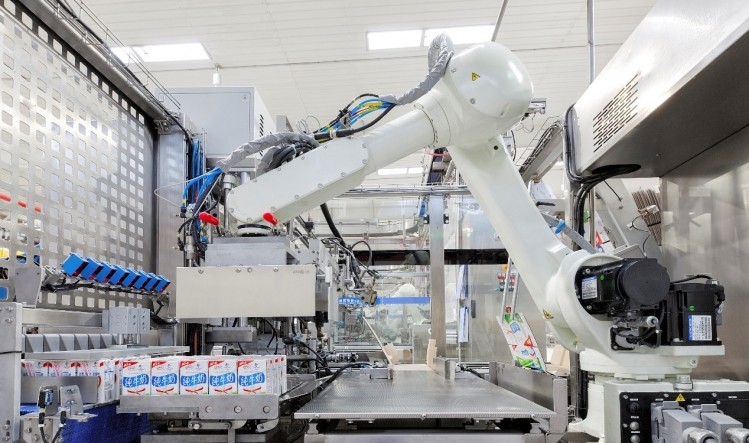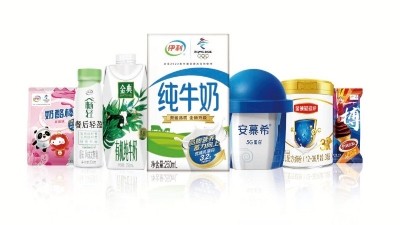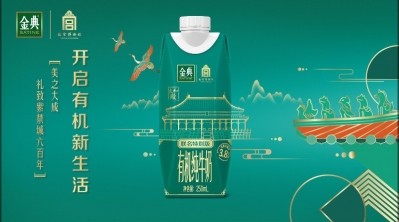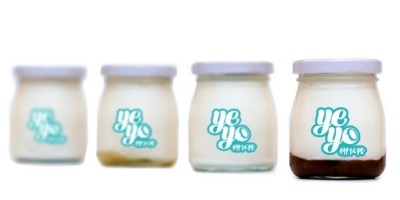‘No innovation, no future’: Yili says digital technology a key driver for aggressive NPD strategy

Yili recently announced what it dubbed the ‘Innovation Trilogy’, stressing that it would be placing added focus on digital transformation, integrating resources to build an innovation system, and driving product innovation with technological R&D.
In line with this, digital technologies have been applied to ‘all procedures and operations from breeding to product consumption’ within the firm so as to create a ‘truly future-oriented digital organization’, according to Yili Group Assistant President Dr Yun Zhanyou.
“[One major area of focus is] to empower innovative products with digital technology – for example Yili’s NOC (Nature Of Cheerfulness) ice cream which caused an online sensation [and] is very sought after,” Dr Yun told FoodNavigator-Asia.
“[In creating this], we conducted an intelligent semantic analysis based on public opinion data, which indicated that consumers are discussing a lot more about the ‘crust’ of ice cream, and the ‘carrot’ flavor was highly rated.
“[These results led us to] market a ‘soft crust’ and optimise the production and distribution of the carrot flavor, which led to increased sales.”
The NOC ice cream was awarded the ‘Best Ice Cream Award’ at the 2020 World Dairy Innovation Awards as a result of this innovation.
Yili also went on an aggressive product innovation drive in 2020, launching multiple types of products in different categories with different functions, from a cheese bubble yoghurt under its major brand Ambrosial to Xinhuo anti-diabetes milk powder formula, to a sparkling water based on milk minerals, to high-protein plant-based milk and many more.
“[We have] also been making multiple innovative breakthroughs via technological R&D to provide consumers with new experiences, [many of which] were launched in 2020 alone,” said Dr Yun.
“Our commitment is to the concept of ‘no innovation, no future’ and [as testament to this], Yili's total number of global patent applications and total invention applications ranked third among the top ten dairy companies across the globe at end-2019.”
Dr Yun also highlighted whole supply chain digitalisation as an important part of Yili’s growth and innovation strategy, with artificial intelligence (AI) playing a crucial role here.
“We have been very rapidly practicing a digital transformation strategy to deeply integrate AI all throughout the upper, middle and lower reaches of [our] industrial supply chain,” he said.
“In the upper sector, Yili introduced video surveillance AI recognition systems to [monitor] the milk quality management process and analyse the cows’ data to provide the best feed for them; in the middle sector we have built ‘smart factories with high production efficiency to digitalise the supply chains, and at the lower end, we have an end-to-end big data-based intelligence insight platform [also] based on AI.
“In the latter, Yili has established a big data radar, which captures new consumer needs and trends through Natural Language Processing (NIP), predicts popular product flavors and nutritional functions, and follows feedback from different people in different regions in real time – [at present, there are over] 840 million pieces of consumer data on this platform.”
Scientific R&D
With a rise in awareness about lactose intolerance in China combined with a public drive for local consumers to increase milk consumption, Yili has also had to come back to basics in terms of scientific research beyond its focus on high-tech digital technologies.
“It is widely believed in the scientific community that 80% of Asian adults lack lactase and experience lactose intolerance as a result, which causes problems such as diarrhoea and bloating after consuming dairy products – [this] to a large extent inhibits the intake of milk or dairy products in Asia,” said Dr Yun.
“After thousands of simulated intestinal tests, Yili developed the LHT (Lactose Hydrolysis Technology) - a technology that breaks down milk lactose into galactose and glucose, which can be better absorbed, thereby solving the problems caused by lactose intolerance.
“This technology has been utilized in the development of the Shuhua Lactose Free milk, which provides a solution to lactose intolerance that affects Asian people so all consumers can enjoy milk.”
South East Asia developments
Although China is its stronghold, Yili has been actively pursuing South East Asia as a growth market for some years now, also relying on rapid R&D and portfolio diversification to conquer the region.
One of its best-known brands in South East Asia is Cremo, which is available in 13 countries including Singapore, Malaysia, Cambodia, Vietnam, Laos, Myanmar and Thailand.
“In Thailand, Yili has been focusing on strengthening the innovative R&D of Cremo and this has led to an annual sales turnover there increasing rapidly year-on-year,” said Dr Yun.
“In addition, in Indonesia more than 20 different Joyday ice creams have been rolled out in more than 40 cities in 22 provinces and are being exported to Singapore, Thailand, and Myanmar.”
Yili has also just completed construction of its Indonesian factory, and will be establishing a ‘dual center’ in South East Asia across its Thailand site and this new facility.
“The establishment of the dual center in Thailand and Indonesia [will help us] further improve services and responsiveness in the local in South East Asian market,” he said.
“Yili's digital technologies and concepts will also be infused in the Indonesia factory, thus creating a new model for [all] overseas factories [moving forward].”


















